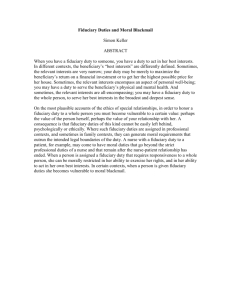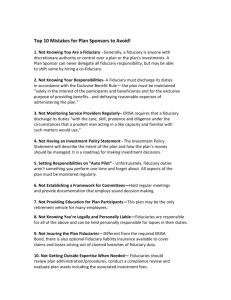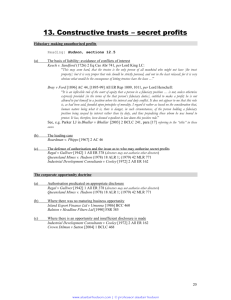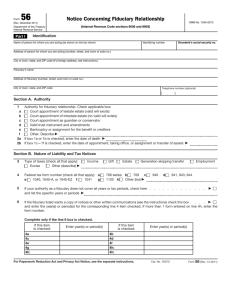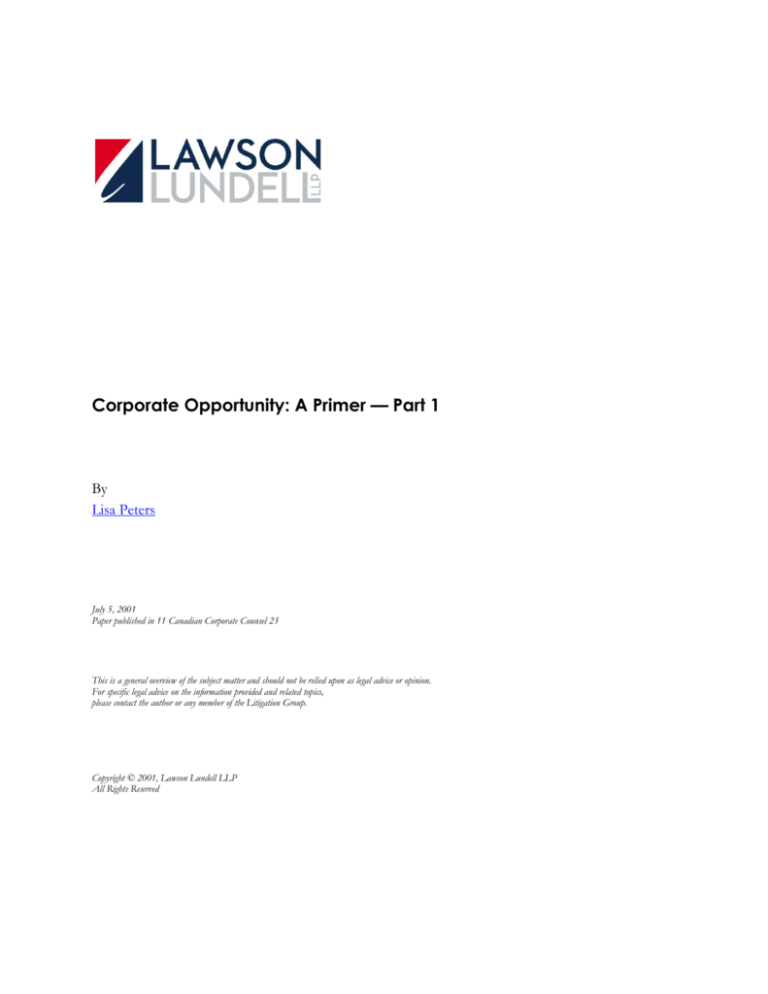
Corporate Opportunity: A Primer — Part 1
By
Lisa Peters
July 5, 2001
Paper published in 11 Canadian Corporate Counsel 23
This is a general overview of the subject matter and should not be relied upon as legal advice or opinion.
For specific legal advice on the information provided and related topics,
please contact the author or any member of the Litigation Group.
Copyright © 2001, Lawson Lundell LLP
All Rights Reserved
2
CORPORATE OPPORTUNITY - A PRIMER
A. What is the Corporate Opportunity Doctrine?
I. A Subset of More General Fiduciary Duties
The corporate opportunity doctrine is a prophylactic and, some might say, restrictive rule which
prohibits fiduciaries from taking for themselves or diverting to an associate or affiliate a
maturing business opportunity which their beneficiary is actively pursuing,1 or which their
beneficiary can be said to have some connection to or expectancy of, and which the beneficiary
might have had an interest in pursuing had the fiduciary disclosed its existence to him or her.2
There is no accepted statement of the doctrine. The formulation in the first paragraph is my
attempt at patching together a comprehensive statement of the law. Bruce Welling has boldly
asserted that the corporate opportunity doctrine “adds nothing useful to our law”.3 While the
formulation of the corporate opportunity doctrine from Canaero is often cited, it is only of
partial assistance because it does not deal with the situation where the beneficiary is not aware of
the opportunity, and does not deal with the thorny questions of how to deal with opportunities
that came to the fiduciary in his or her personal capacity, opportunities that are outside of the
beneficiary’s usual line of business, and opportunities of which the beneficiary could not have
taken advantage.
It is important to keep in mind that the corporate opportunity doctrine is a subset of a corporate
fiduciary’s more general duties. One of those duties is the duty not to enter into engagements in
which they have, or can have, a personal interest conflicting or which possibly may conflict with
the interests of those whom they are bound to protect: Aberdeen Railway Co. v. Blaikie Bros.,
(1854), [1843-1860] All E.R. 249 at 252 (H.L.), per Lord Cranworth L.C.
The doctrine, like the duties, is founded on a form of corporate “moral code”. The doctrine’s
focus is discouraging directors from succumbing to the temptation of profiting personally from
their office, rather than protecting companies from actual loss.
Directors are one of the well-established categories of corporate fiduciaries. They owe fiduciary
duties to the company on whose board they serve.
1
This first branch of the doctrine arises out of Laskin J.’s judgment in Canadian Aero Service Ltd. v. O’Malley
(1973), 40 D.L.R. (3d) 371 at 382 (S.C.C.) (“Canaero”).
2
This is one woman’s statement of the extent of the doctrine. In the texts I reviewed, none of the academics have
been bold enough to add this second branch to Laskin’s formulation, although they summarize cases in which the
opportunity was clearly not one which the company was actively pursuing, or even knew about.
3
B.L. Welling, Corporate Law in Canada - The Governing Principles, 2nd ed. (Toronto: Butterworths, 1991), at
page 409. Welling prefers dealing with corporate opportunity as part of the fiduciary’s obligation not to put self
interest ahead of the interests of the beneficiary and not to profit by virtue of his position.
LAWSON LUNDELL
3
II. Procedural Note
An action alleging usurpation of a corporate opportunity and, thus, breach of fiduciary duty by a
director, is usually brought by the company, as the wrong is one suffered by the company.
However, it may take the form of a derivative action; leave to bring an action for usurpation of a
corporate opportunity as a derivative action has been granted in B.C.: Drove v. Mansvelt, [1998]
B.C.J. No. 497 (S.C.); Primex Investments Ltd. v. Northwest Sports Enterprises Ltd. (1995), 13
B.C.L.R. (3d) 300 (S.C.), rev’d in part (1996), 26 B.C.L.R. (3d) 357 (C.A.).
III. An Aside on Joint Venturers
Joint venturers do not form one of the well-established classes of fiduciaries. They can be found
to owe each other fiduciary duties (and thus may be subject to the corporate opportunity
doctrine), particularly where one joint venturer has control or an advantage over the other
because of its role as manager or operator of the joint venture.
It may be possible to exclude a fiduciary relationship in the express language of the joint venture
agreement: see Midcon Oil and Gas Ltd. v. New British Dominion Oil Co., [1958] S.C.R. 314
and Erehwon Exploration Ltd. v. Northstar Energy Corp. (1993), 108 D.L.R. (4th) 709 (Alta.
Q.B.).
This approach makes sense. Joint venture partners are usually sophisticated parties of similar
bargaining strengths dealing at arm’s length. It should be open to them to limit their
responsibilities to each other in the contract.
B.
The Test for Determining Whether an Actionable Usurpation of a Corporate
Opportunity has Taken Place
The question of whether a director or other fiduciary has usurped a corporate opportunity is a
question of fact. Laskin J.’s effort in Canaero to enunciate the factors a court should consider in
making this factual determination is cited repeatedly in the jurisprudence. He stated (at page
391):
...I am not to be taken as laying down any rule of liability to be read as if it were a
statute. The general standards of loyalty, good faith and avoidance of a conflict
of duty and self-interest to which the conduct of a director or senior officer must
conform, must be tested in each case by many factors which it would be reckless
to attempt to enumerate exhaustively. Among them are the factor of position or
office held, the nature of the corporate opportunity, its ripeness, its specificness
and the director’s or managerial officer’s relation to it, the amount of knowledge
possessed, the circumstances in which it was obtained and whether it was special
or, indeed, even private, the factor of time in the continuation of fiduciary duty
where the alleged breach occurs after termination of the relationship with the
company, and the circumstances under which the relationship was terminated,
that is whether by retirement or resignation or discharge.
LAWSON LUNDELL
4
C. The Problems Arising
1.
How do you apply this fact driven test? Do you win if more factors are in your client’s
favour than not? Do any of the factors have more weight than others?
2.
Can you ever advise a client that something is not a corporate opportunity?
3.
Can the director protect him or herself by getting the corporation’s approval to take the
opportunity? If so, who should give that approval and what form should it take?
4.
What is the content of the director’s duty to disclose in this context?
D. Applying the Test
The first problem with this test is that is fact driven. Laskin J. did not tell us whether any of the
factors should be given more weight than others, nor how many of these factors, taken together,
will be enough to tip the balance in favour of a finding of breach of fiduciary duty.
I. An Aid to Weighing the Factors
J. Anthony VanDuzer, in his text The Law of Partnerships and Corporations, (Toronto: Irwin
Law, 1997),4 takes the view that the test from Canaero necessarily engages the court in a
weighing of the factors. VanDuzer organizes the factors under two key questions: Does the
opportunity belong to the corporation, considering how closely it is connected to the
corporation? What is the relationship of the fiduciary to the opportunity?
The more factors in favour of a corporate interest and a close relationship between the
opportunity and the fiduciary, the more likely (says he5) that a court will find that there has been
a breach of fiduciary duty.
VanDuzer has prepared a form of questionnaire which I have found useful in analyzing the facts
of a particular case when advising a client about the corporate opportunity doctrine. For ease of
reference, I have copied it in its entirety, and attached it as Appendix A.
II. The Approach in Other Jurisdictions
Had courts in other jurisdictions enunciated a less situation based standard for assessing alleged
breaches of the corporate opportunity doctrine, there would be hope for formulation of a more
definitive test by the Supreme Court of Canada. Unfortunately, an examination of U.S., English
and Australian jurisprudence reveals that those jurisdictions have adopted similarly fact driven
tests. Indeed, Australian cases have cited the Canaero test with approval.
In Broz v. Cellular Information Systems Inc., 673 A.2d 148 (Del. S.C. 1996), Veasey J. stated:
4
At page 225-233.
5
At page 232.
LAWSON LUNDELL
5
It is important to note, however, that the tests enunciated in Guth6 and subsequent
cases provide guidelines to be considered by a reviewing court in balancing the
equities of an individual case. No one factor is dispositive and all factors must be
taken into account insofar as they are applicable. Cases involving a claim of
usurpation of a corporate opportunity range over a multitude of factual settings.
Hard and fast rules are not easily crafted to deal with such an array of complex
situations.
In S.E.A. Food International Pty Ltd. v. Lam (1998), 130 FCA , Cooper J. of the Federal Court of
Australia stated:
What is to be drawn from the authorities is that a director will act in breach of his
fiduciary obligations to a company (the scope of which will vary in the
circumstances of each particular case) if he or she takes up an opportunity for
profit where there is a sufficient temporal and causal connection between the
obligations and the opportunity. What is a sufficient connection will depend, in
any particular case, upon a number of factors, including the circumstances in
which the opportunity arises and the nature of it and the nature and extent of the
company’s operations and anticipated future operations.
There are some helpful trends in the U.S. jurisprudence; for example in most states, and in the
federal court system, rejection of the corporate opportunity by the company is a complete
defence,7 and in many states, the courts have adopted a “line of business” test,8 which requires
that the opportunity in question be an activity closely associated with the current or anticipated
business of the corporation for it to be labelled a “corporate opportunity”, and for a duty to offer
it to the corporation to be fairly implied.
E. Is Everything a Corporate Opportunity?
The reality is that almost every business opportunity that the director might interest himself in
has the potential to be a corporate opportunity which he must offer to the corporation.
6
Referring to Guth v. Loft, Inc., 5 A. 2d 503 (Del. Ch. 1939)., where the Court stated:
On the other hand, it is equally true that, if there is presented to a corporate officer or director a
business opportunity which the corporation if financially able to undertake, which is, from its
nature, in the line of the corporation’s business and is of practical advantage to it, is one in which
the corporation has an interest or a reasonable expectancy, and, by embracing the opportunity, the
self-interest of the officer or director will be brought into conflict with that of his corporation, the
law will not permit him to seize the opportunity for himself.
7
See, for example, McCabe Packing Co. v. U.S., 809 F. Supp. 614(C.D. Ill. 1992); Case v. Murdock, 488 N.W.2d
885 (S.D.S.C. 1992); Field v. Allyn, 457 A.2d 1089 (Del. Ch. 1983).
8
See, for example, Urban J. Alexander Co. v. Trinkle, 224 S.W.2d 923 (Ky. 1949), or Burg v. Horn, 380 F.2d 879
(2nd Circ. N.Y. 1967).
LAWSON LUNDELL
6
I. Inability of Company to take Advantage Not Determinative
The fact that the company could not have taken advantage of the opportunity is not
determinative. Some of the older cases suggest this fact is not even relevant.
For instance, the financial inability of the company to avail itself of the opportunity did not
excuse the corporate fiduciary in Redekop v. Robco Construction Ltd. (1978), 7 B.C.L.R. 268
(S.C.), and in Weber Feeds Ltd. (Trustee of) v. Weber (1979), 24 O.R. (2d) 754 (C.A.).
The fact that the party offering the opportunity approached the fiduciary in his personal capacity,
and expressed a desire to work with him, and not the company, did not constitute a defence in
I.D.C. v. Cooley, [1972] 1 W.L.R. 443 (H.C.).
The U.S. courts have demonstrated a more pragmatic approach. In most states, inability of the
company to avail itself of the opportunity will be either determinative or highly significant.9
II. A Few Rays of Sunlight
There are some recent indications that courts will not ignore business realities and will not
interpret the corporate director’s fiduciary duty so strictly that he or she is effectively restricted
to doing business for the benefit of the company only.
In Re Sports Villas Resort Inc., [1998] N.J. No. 314 (Newf. S.C. - T. Div.), aff’d [2000] NFCA
11, other directors of the plaintiff company complained of the conduct of a director (Dobbin) in
incorporating a company to acquire a golf course which was owned by another company which
he managed. The plaintiff company operated a resort and golf course itself, in another region of
Newfoundland. The applicant directors wanted Dobbin to be disqualified from being a director
of Villas Resort Inc (“SVRI”) for as long as he and his family held an interest in the new
company. One of the applicants’ arguments was that Dobbin had allowed his personal interest to
conflict with his fiduciary duty by usurping a corporate opportunity. The Court concluded that
the shareholders of SVRI had not agreed that all future golf course developments within the
Province would be acquired or operated by SVRI. The Court found that Dobbin’s business
opportunity of developing the other golf course was acquired independently of his role as a
director of SVRI.10
F. Corporate Approval
Given the difficulty in applying the test from Canaero to determine whether a fiduciary duty has
been breached, it is not surprising that fiduciaries have attempted to avoid the issue by obtaining
some sort of corporate approval when they are planning to take for themselves an opportunity
which might run afoul of the doctrine.
9
See discussion in W.E. Knepper and D.A. Bailey, Liability of Corporate Officers and Directors, 6th ed.
(Charlottesville: Lexis Law Publishing, 1998), at 144-145.
10
Newfoundland appears to be a hotbed of corporate opportunity jurisprudence. Another recent case from that
Province, Slate Ventures Inc. v. Hurley (1996), 27 B.L.R. (2d) 41 (Nfld. S.C.T.D.), aff’d [1997] N.J. No. 252
(C.A.), contains a helpful review of the law.
LAWSON LUNDELL
7
There is no consensus on how they can effectively do so in order to immunize themselves from a
court ruling that they breached their fiduciary duty.
I. Basis in Canaero
Laskin J. left the door open for a “corporate approval” defence in Canaero when he stated at
page 382 that “a director or a senior officer is precluded from obtaining for himself, either
secretly or without the approval of the company (which would have to be properly manifested
upon full disclosure of the facts), any property or business advantage either belonging to the
company or for which it has been negotiating...” [emphasis added].
Once again His Lordship leaves us with questions: What is the proper manifestation of corporate
approval? What constitutes full disclosure of the facts?
II. Distinction between Rejection and Approval?
You will recall, from your law school days, the decision of the Supreme Court of Canada in Peso
Silver Mines Ltd. v. Cropper (1966), 58 D.L.R. (2d) 1. The directors in that case were found not
to have breached their fiduciary duties because the company had previously considered and
rejected the corporate opportunity in question.
This type of rejection is obviously different in substance and form from a request by a director
that the company allow him to take the opportunity in the place of the company.
The decision in Peso Silver Mines has been criticized by academics, and some would say that
Canaero has implicitly overruled the notion that corporate rejection is enough. Yet postCanaero, there are cases in which rejection of the opportunity by the company’s board of
directors (as opposed to a resolution of disinterested directors or a resolution of the shareholders
approving the taking of the opportunity by a director) will constitute a full defence to an
allegation of usurpation of corporate opportunity: Martin v. Columbia Metals Corporation Ltd.
(1980), 12 B.L.R. 72 (Ont. H.C.J.); Cariboo Press (1969) Ltd. v. O’Connor (14 February 1996),
Vanc. Reg. No. CA018687 (B.C.C.A.); Queensland Mines Ltd. v. Hudson, [1978] 52 A.L.J.R.
379 (P.C.).11
As counsel, I would prefer to defend a director who had obtained corporate approval on
disclosing that he or she planned to take the opportunity, rather than a director relying on a more
general corporate rejection of the opportunity. Nonetheless, this line of authorities is available
for situations where a director consults you after the fact, when it is too late to obtain formal
corporate approval.
11
See also two pre-Canaero cases: Boston Shoe Co. Ltd. v. Frank (1915), 48 C.S. 66 (Que.), and New Zealand
Netherlands Society “Oranje” Inc. v. Kuys, [1973] 1 W.L.R. 1126 (P.C.).
LAWSON LUNDELL
8
III. Confusion over Proper Corporate Body to Grant Approval
The director would be prudent to obtain a resolution from the company approving his taking of
the opportunity. But should that resolution come from the Board or the shareholders?
a) One View - The Board
The authors12 of Gower’s Principles of Modern Company Law, 6th ed. (London: Sweet &
Maxwell, 1997) take the view that the Board can make the decision to reject the opportunity and
permit the director to take it, provided that the director declares his interest to the board, and
absents himself from discussion of the matter.
Rosemary Teele, in her article “The Necessary Reformulation of the Classic Fiduciary Duty to
Avoid a Conflict of Interest or Duties (1994) 22 Aust. Bus. Law Rev. 99, at 101, suggests that
cases allowing disclosure to and approval by the Board are an adaption of the law to commercial
reality.
The authors of Palmer’s Company Law, Vol. 2, loose-leaf ed. (London: Sweet & Maxwell,
1992) put a different spin on matters. They suggest that technically, the Board cannot approve a
director taking a corporate opportunity even where there is full disclosure and the interested
director abstains from voting. However, they go on to opine that a bona fide decision by the
board (after full disclosure) that the company should not avail itself of a particular opportunity
would mean that the opportunity is no longer a corporate one, and that a director’s subsequent
exploitation of the opportunity personally would not be a breach of duty.
b) Another View - The Shareholders
Mark Ellis, in his text Fiduciary Duties in Canada, loose-leaf ed. (Scarborough: Carswell, 1993),
takes the position that unanimous approval by the shareholder should be the rule of thumb.
Other commentators on the subject suggest that shareholder approval is preferable, in part
because of the perception of the Board members as “cronies”.13
The Alberta Court of Queen’s Bench endorsed this view in Abbey Glen Property Corporation v.
Stumborg, [1976] 2 W.W.R. 1, aff’d 91978), 4 B.L.R. 113 (Alta. C.A.).
c) The Complication of Section 201(7) of the Company Act
Section 201(7) of the Company Act provides as follows:
An application made or an action brought or defended under this section must not
be stayed or dismissed merely because it is shown that an alleged breach of a
right, duty or obligation, owed to the company, has been or might be approved by
12
P. Davis & D.D. Prentice, eds.
13
T. Cockburn, “Fiduciary Disclosure Obligations” in Disclosure Obligations in Business Relationships (Sydney:
Federation Press, 1996) , at 48, and Jeffrey Legault, “Redefining Corporate Opportunity in Canada”, (1996) 27
B.L.R. (2d) 69, at 75.
LAWSON LUNDELL
9
the members of that company, but evidence of that approval or possible approval
may be taken into account by the court in making an order under this section.
Welling, never one to equivocate, asserts that these types of sections in company legislation have
abolished the concept of ratification.14 Certainly the section makes it difficult for one to assure a
client that an action alleging breach of fiduciary duty will be summarily dismissed once the
person alleged to have usurped a corporate opportunity proves that the shareholders unanimously
approved his conduct.
Quaere whether this section would have any impact where corporate approval was given by the
directors.
d) Any Assistance in the Articles?
Young J. of the Supreme Court of New South Wales suggested that determining the proper
corporate body to approve the taking of a corporate opportunity depends on the company’s
constitution. In Fexuto Pty Limited v. Bosnjak Holdings Pty Limited, [1998] NSWSC 413, he
opined:
The first category is where the company’s constitution leaves it to the directors to
take up or leave a business opportunity. In such a case, the bona fide resolution
of the directors after full information should be sufficient. The second category is
where the decision impacts on the value of the shareholders’ investment. In such
a case, the shareholders are vitally concerned, and only they may give relief in a
general meeting after full disclosure.
e) Another Perspective
One academic suggests that where the director is seeking approval in advance of taking the
opportunity, he should seek it from the board, which can change the vary nature of the
opportunity by rejecting it on behalf of the company. However, where the breach of fiduciary
duty has already occurred, and the director is seeking exculpation, he must obtain a resolution of
the majority of the shareholders.15 The problem with this formulation from a B.C. perspective is
the existence of section 201(7).
IV. Sufficiency of Disclosure
The nature and extent of the disclosure a director must make in a self-interested transaction is
more widely discussed in cases dealing with directors transacting with the company.
Extrapolating from these cases, it is fair to say that the director will be required to disclose all
“material” information relating to the corporate opportunity and his or her proposed interest in it.
14
At page 428.
15
R.P. Austin, “Fiduciary Accountability for Business Opportunities”, in P. Finn, ed., Equity and Commercial
Relationships (Sydney: Law Book Co. Ltd., 1987), at 183.
LAWSON LUNDELL
10
If the court finds that the disclosure was inadequate, the corporate approval may be deemed
invalid: RDS Diagnostics Ltd. v. Stronell, [1999] O.J. No. 2619 (S.C.J.).
G. Conclusion
On the current state of the law, it is impossible to advise a client categorically as to the type of
corporate approval of the taking of a corporate opportunity which will immunize him from suit
or even give him a good chance of success on a summary trial.
An extra cautious client might seek out and obtain approval of both the Board and the
shareholders. A more practical approach might be to consult the company’s articles, and take a
principled approach to the problem, choosing the proper corporate body from whom one obtains
approval based on which body has authority for engaging the company in new business, and
based on the particular nature, scope and value of the corporate opportunity.
Similarly, advising the client on what will constitute a corporate opportunity in the first place,
and their chance of success should the matter proceed to litigation, is a daunting task. One must
resort to the Canaero tests, and VanDuzer’s list of questions, and attempt to replicate the
weighing process in which the court will inevitably engage.
LAWSON LUNDELL
Vancouver
1600 Cathedral Place
925 West Georgia Street
Vancouver, British Columbia
Canada V6C 3L2
Telephone 604.685.3456
Facsimile 604.669.1620
Calgary
3700, 205-5th Avenue SW
Bow Valley Square 2
Calgary, Alberta
Canada T2P 2V7
Telephone 403.269.6900
Facsimile 403.269.9494
Yellowknife
P.O. Box 818
200, 4915 – 48 Street
YK Centre East
Yellowknife, Northwest Territories
Canada X1A 2N6
Telephone 867.669.5500
Toll Free 1.888.465.7608
Facsimile 867.920.2206
genmail@lawsonlundell.com
www.lawsonlundell.com


